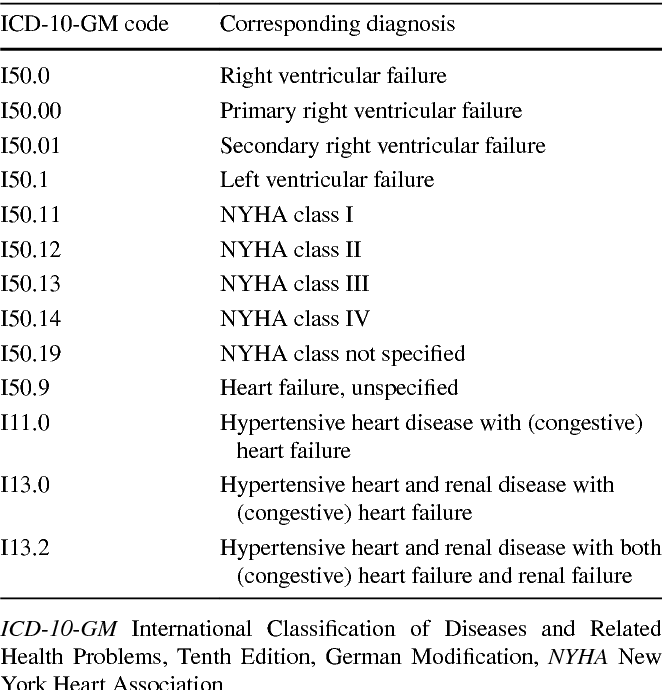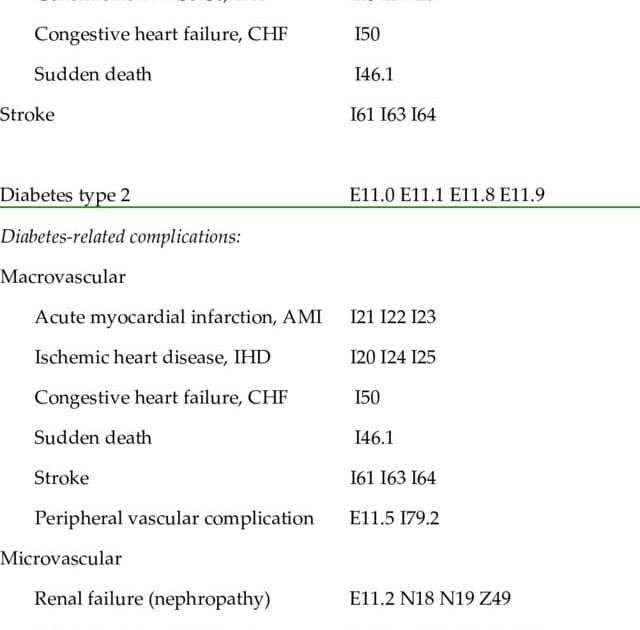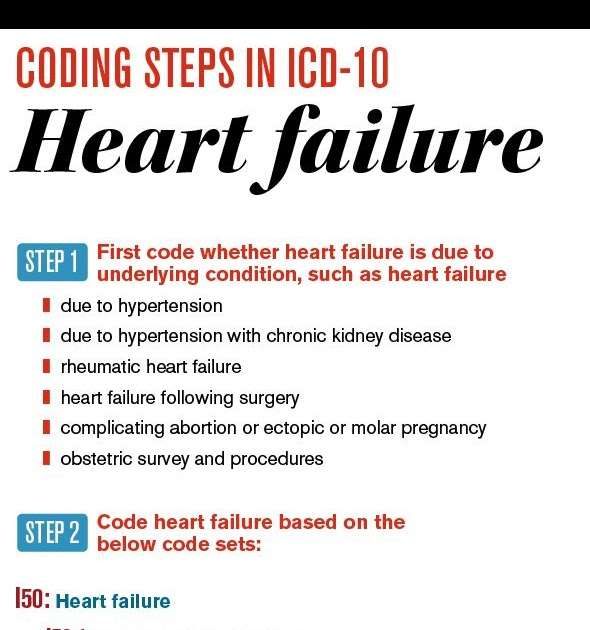How To Code If No Cause For Heart Failure Is Documented
If no cause for heart failure is spcified in the note, it is better to code just the heart failure diagnosis alone , even if a secondary diagnosis is present in the note, such as hypertension. In other words, the medical coder does not have the liberty to makes the connection between another condition and heart failure, unless it is already present in the chart. In such a case, the coder should assign separate codes for the two conditions.
Also Check: How To Lower Resting Heart Rate Immediately
What Is Acute On Chronic Chf
When heart muscles are damaged chronically, the term Chronic is used to define such a condition but sometimes, a chronically damaged heart can get a viral infection, certain vessels blockage, or shortness of breath leading to acute heart failure of chronic CHF. Medical professionals call it acute on chronic heart failure. The simple definition could be Sudden onset of chronic heart condition.
Chf Icd 10 Codes And Guidelines
Most of the heart failure codes include in chapter 9 of ICD-10 CM manual, diseases of circulatory system, code range I00-I99.
- Combination code If patient has any type of heart failure and hypertension, it should be combined and coded as I11.0 eventhough physician has not linked both. It should not be coded combined if the medical record states the conditions are unrelated.
- Heart failure should be coded additionally when coding I11.0
- Do not code I11.9 when coding I11.0 .
- When coding biventricular heart failure it is necessary to code the type of left heart failure also according to the code also note with I50.82
Go by Failure, Heart to find correct codes for heart failure in ICD-10 CM manual index.
Look at the below scenarios to clearly understand the coding concepts of CHF.
CHF ICD 10 Code Example 1
Elizabeth is a 65 year old female who comes to emergency department for shortness of breath and leg edema from past 2 days. She came to visit doctor as the symptoms are getting worse. She has hypertension and takes Lisinopril for the same. She does not have chest pain or palpitation. She is not a smoker. Her family history includes heart disease for her mother and brother. Vitals showed temperature 97.3 F, heart rate 72 bpm, respiratory rate 25, BP 150/96 mmHg. Physical exam showed pitting edema on both the extremities, shortness of breath and dry skin. Physician ordered for blood tests, EKG and chest X-ray. This case was diagnosed as acute diastolic heart failure.
Don’t Miss: Nursing Diagnosis For Congestive Heart Failure
Hypertensive Heart Disease With Heart Failure
- 2016201720182019202020212022Billable/Specific Code
- I11.0 is a billable/specific ICD-10-CM code that can be used to indicate a diagnosis for reimbursement purposes.
- The 2022 edition of ICD-10-CM I11.0 became effective on October 1, 2021.
- This is the American ICD-10-CM version of I11.0 other international versions of ICD-10 I11.0 may differ.
use additional code
Coding For Congestive Heart Failure

April 23, 2021 / By Rebecca Caux-Harry
I was reading an article the other day about a young man who developed severe biventricular heart failure after consuming a large quantity of an energy drink every day for 2 years. I remember my days as a college student and the need to be mentally alert for my classes and studies. We didnt have energy drinks at that time, but there were, and still are, caffeine pills. I tried them once or twice and found myself so overwhelmed by the caffeine side effects that there was no benefit. I guess I was lucky in that way.
While the young British student is expected to make a partial to full recovery with ongoing treatment, the article got me thinking about the ICD-10 codes for congestive heart failure . CHF is when the heart muscle doesnt pump blood to the rest of the body as it should. The condition is usually progressive, meaning most people arent cured, but rather managed with medication and lifestyle changes.
When I first started coding, we only had 3 ICD-9 codes for CHF: 428.0, 428.1 and 428.9. A few years later, those codes were expanded with specificity for acuity and type . Now, with ICD-10 we have a wide variety of codes to choose from, but as always, selection of the most accurate and specific code depends entirely on the physicians documentation.
Rebecca Caux-Harry, CPC, is a professional fee coding specialist with 3M Health Information Systems.
You May Like: Does Fever Increase Heart Rate
You May Like: Which Of The Following Helps Return Blood To The Heart
Acute Systolic Chf Icd 10
If the patients condition is acute, the second code under this subcategory should be used for reimbursement purposes. If the medical note states that the patients condition has been worsening or there is an emergency condition of chronic failure but does not document it as acute, do not presume it as an acute condition.
A query to the medical doctor would work here best asking about the exact condition. The ICD 10 code for acute systolic CHF is I50.21.
Determine The Cause Of Heart Failure
One of the most important things you understand, when coding for heart failure, is that there can be many very different reasons why somebody can develop heart failure, and the ICD-10-CM coding system, as complex as it is, allows for very fine granuation in this respect. Therefore, your first decision to make, when looking for a code to use, is to determine, from the note, what is the underlying cause for heart failure. To illustrate, I am listing a few of the more common ICD-10 codes for heart failure based on cause:
- I11.0 Hypertensive heart disease with heart failure
- I09.81 Rheumatic heart failure
- I97.131 Postprocedural heart failure following other surgery
- I97.130 Postprocedural heart failure following cardiac surgery
- I13.0 Hypertensive heart and chronic kidney disease with heart failure and stage 1 through stage 4 chronic kidney disease, or unspecified chronic kidney disease
- P29.0 Neonatal cardiac failure
Note that none of the above conditions where heart failure is present use the root I50 for buidling the ICD-10 code.
Read Also: What Does A Normal Heart Rate Look Like
Unspecified Systolic Heart Failure
- 2016201720182019202020212022Billable/Specific Code
- I50.20 is a billable/specific ICD-10-CM code that can be used to indicate a diagnosis for reimbursement purposes.
- The 2022 edition of ICD-10-CM I50.20 became effective on October 1, 2021.
- This is the American ICD-10-CM version of I50.20 other international versions of ICD-10 I50.20 may differ.
- Applicable To annotations, or
Acute On Chronic Diastolic Chf Icd 10
The Acute On Chronic Diastolic CHF ICD 10 code is I50.33.
When looking at diastolic under failure/heart in the alphabetic index, the ICD 10 system provides subcategory I50.3 for diastolic heart failure. Under this category, several codes according to different specified descriptions are provided I50.33 at the bottom of this subcategory is the code of choice to fully describe the condition acute on chronic diastolic heart failure.
You May Like: Is Stomach Ache Sign Of Heart Attack
What Is The Icd 10 Code For Acute Decompensated Heart Failure
3.9/5codeheart failureheart failureheart failureCodingacute
Consequently, what is the ICD 10 code for decompensated heart failure?
Acute on chronic diastolic heart failureI50. 33 is a billable/specific ICD10-CM code that can be used to indicate a diagnosis for reimbursement purposes. The 2020 edition of ICD10-CM I50. 33 became effective on October 1, 2019.
Likewise, what is the code for congestive heart failure? ICD-10 has no code for congestiveheart failure the term is included in code I50. 9 Unspecified heart failure.
Beside this, what does decompensated mean in heart failure?
Specialty. Cardiology. Acute is a sudden worsening of the signs and symptoms of heart failure, which typically includes difficulty breathing , leg or feet swelling, and fatigue. ADHF is a common and potentially serious cause of acute respiratory distress.
What is stage a heart failure?
Stage A is considered pre-heart failure. It means you are at high risk of developing heart failure because you have a family history of heart failure or you have one of more of these medical conditions: Hypertension. Diabetes. Coronary artery disease.
What Is The Main Term For Congestive Heart Failure
Congestive Heart Failure Congestive heart failure is a chronic progressive condition that affects the pumping power of your heart muscle. While often referred to simply as heart failure, CHF specifically refers to the stage in which fluid builds up within the heart and causes it to pump inefficiently.
Don’t Miss: Does Aspirin Increase Heart Rate
Diseases Of The Circulatory Systemtype 2 Excludes
- 2016201720182019202020212022Non-Billable/Non-Specific Code
Code First
Chronic Diastolic Heart Failure

- 2016201720182019202020212022Billable/Specific Code
- I50.32 is a billable/specific ICD-10-CM code that can be used to indicate a diagnosis for reimbursement purposes.
- The 2022 edition of ICD-10-CM I50.32 became effective on October 1, 2021.
- This is the American ICD-10-CM version of I50.32 â other international versions of ICD-10 I50.32 may differ.
- Applicable To annotations, or
Don’t Miss: Watch With Heart Rate Monitor
Coding Tip: Hypertension With Heart Involvement In Icd
Kim Boy, RHIT, CDIP, CCS, CCS-P
This Coding Tip was updated on 12/10/2018
The word with is sequenced immediately following the main term in the Alphabetic Index and not in alphabetical order.
The classification presumes a causal relationship between hypertension and heart involvement and between hypertension and kidney involvement, as the two conditions are linked by the term with in the Alphabetic Index. Even in the absence of provider documentation explicitly linking them, these conditions should be coded as related.
Hypertension with heart conditions classified to I50.-or I51.4-I51.9. are assigned a code from category I11, Hypertensive heart disease. If the provider specifies a different cause then they would be coded separately and not linked. This would be the same if the physician gives another etiology for the CKD. It is an assumed link when NO other cause has been documented.
Chronic Systolic Chf Icd 10
The Chronic Systolic CHF ICD 10 code is I50.22. The third code in this category as chronic systolic heart failure I50.22 is the code of choice here. The main code has excluded notes beneath it that states that a code cannot be used here if there is a combination of the acute and chronic condition of systolic/diastolic heart failure.
Don’t Miss: Heart Rate When Having A Heart Attack
Symptoms Of Congestive Heart Failure
Heart failure can be ongoing , or your condition may start suddenly . Heart failure signs and symptoms may include shortness of breath when you exert yourself or when you lie down, fatigue and weakness, swelling in your legs, rapid or irregular heartbeat, reduced ability to exercise, persistent cough or wheezing with white or pink blood-tinged phlegm, increased need to urinate at night, swelling of your abdomen , very rapid weight gain from fluid retention, lack of appetite and nausea, difficulty concentrating or decreased alertness, sudden or severe shortness of breath and coughing up pink and foamy mucus, and chest pain if your heart failure is caused by a heart attack
Assumptive Coding For Heart Disease A Coders Perspective
Official guidance on ICD-10-CM coding raises questions regarding how to document cardiac care.
The first step in choosing the proper ICD-10-CM code is reading the medical documentation to identify the diagnosis the provider has documented and confirmed. If there is no confirmed diagnosis, look for the sign or symptom that brought the patient in for the encounter.
Well, at least that is what we have been taught, and have had hammered into our thinking not only with ICD-9, but with the launching of ICD-10 in 2015, and its platform of coding to the highest specificity. That is why I am at a loss when it comes to the 2018 instructions for coding hypertensive heart disease in the ICD-10-CM Official Guidelines for Reporting for FY 2018.
I have had many coders ask me, are we supposed to assume a disease has a causal relationship when it is not documented as such by the physician?
What coders are referring to are the stated ICD-10-CM guidelines on this topic, and how they have coders scratching their heads, having to go against everything they have been taught about code selection.
First, lets look at what hypertensive heart disease is.
Hypertensive heart disease refers to heart conditions caused by high blood pressure.
The heart working under increased pressure may cause some different heart disorders. Hypertensive heart disease includes heart failure, thickening of the heart muscle, coronary artery disease, and other conditions.
Narrowing of the Arteries
Read Also: Do Heart Attacks Last For Days
What Is Diastolic Chf
Diastolic heart failure occurs when a heart is unable to relax fully, making ventricles deprived of enough blood to pump the blood to other organs. The volume and pumping force decreases significantly making the heart as well as other body areas deprived of oxygenated blood significantly. Doctors use different medications as well as surgical options to treat this condition.
Diastolic Chf Icd 11 Code
The Diastolic CHF ICD 11 Code is BD10. ICD 11 does not have category and subcategory but these terms are named as stem code and extensions respectively. The main stem code is the same just like the category in ICD-10 BD10 there is no code for exacerbation.
There are some extensions about types of heart failure that are divided based on code rules of ICD-11 like if there is an effect on physical activity or not and others. Currently, BD10 with an acute extension should be used to code this condition.
Donât Miss: What Is Good Resting Heart Rate
Also Check: Watches Heart Rate
Example Of Hypertension And Heart Involvement:
- Patient is discharged with final diagnosis of exacerbated CHF, and a secondary diagnosis of hypertension. For this patient, CHF and hypertension would be coded as code I11.0, Hypertensive heart disease with heart failure since the causal relationship is assumed due to the word with following the main term in the Alphabetic Index under hypertension. Since the heart disease falls within the code range of I50.- or I51.4-I51.9 the link would be assumed. Additional code for the type of heart failure would be assigned as a secondary diagnosis, I50.9. This was verified at the AHIMA Coding Community meeting in Baltimore, MD on October 15, 2016 by Nelly Leon-Chisen.
- Patient is discharged with final diagnosis of atherosclerotic heart disease with unstable angina and hypertension. For this patient, the causal relationship would not be linked because the heart disease does not fall within the code range listed for the causal effect to be assumed. CAD falls within the code range of I25.-. The code range for the assumed link is I50.- or I51.4-I51.9 only.
References
Fransoo Et Al And Fransoo Et Al

- In The 2013 RHA Indicators Atlas by Fransoo et al. and The 2019 RHA Indicators Atlas by Fransoo et al. residents were considered to have CHF if they met one of the following conditions:
- one or more inpatient hospitalizations in one year with a diagnosis for CHF: ICD-9-CM code 428 or ICD-10-CA code I50 OR
- two or more physician visits in one year with a diagnosis for CHF .
Only Manitoba residents aged 40 and older were included.For more information, please see:
Recommended Reading: Does Caffeine Increase Heart Rate
You May Like: Left Sided Heart Failure Treatment
Acute On Chronic Combined Systolic And Diastolic Chf Icd 10
The acute on chronic combined systolic and diastolic CHF ICD 10 code is I50.43.
A combined condition of systolic and diastolic CHF is not a very common but dangerous condition. In this abnormal situation, a heart neither contract nor relax properly between beats leading to a serious medical condition. If a medical note states that the patient has acute on chronic with combined diastolic and systolic heart failure, ICD-10 has provided a combination code to fully describe this condition.
The main term combined after following failure/heart in the alphabetic index will lead to subcategory I50.4. The combination code for reimbursement purposes is I50.43.
Also Check: What Should My Heart Rate Be Working Out
Conquer All Your Heart Failure Icd
Hint: Report I50.21 for acute systolic heart failure.
Heart failure can be tricky to code because you may see numerous acronyms, and you need to decipher whether its chronic, acute, or acute on chronic. If you dont pay close attention to all of the details in the documentation, you run the risk of reporting the wrong code.
Learn which codes you will report for different types of heart failure to always report clean claims in your cardiology practice.
Differentiate Between Systolic, Diastolic Heart Failure
When a patient has heart failure, their heart does not adequately pump blood to meet their bodys need for blood and oxygen. This, in turn, can cause blood and fluids to back up in the patients body in their lungs, hands, or feet.
Heart failure can be categorized as systolic or diastolic, says Rebecca Sanzone, CPC, CPMA, quality assurance specialist at St. Vincent Medical Group/ Accension Health and coding consultant at the American College of Cardiology.
Systolic heart failure: HFrEF is the acronym for heart failure with reduced ejection fraction, which is also known as systolic heart failure. When a patient has systolic heart failure, the left ventricle of their heart is not able to contract normally, so their heart cant pump with enough force to push enough blood into circulation.
The clinical definition of systolic heart failure is an ejection fraction < 50%, Sanzone explains.
In diastolic heart failure, the ejection fraction > = 50%, Sanzone adds.
Also Check: Does High Potassium Cause Heart Attacks
